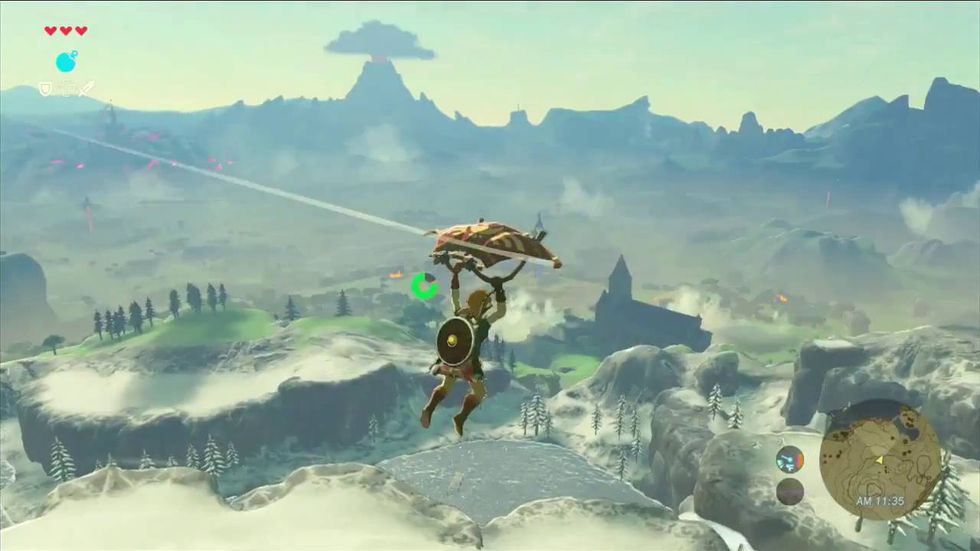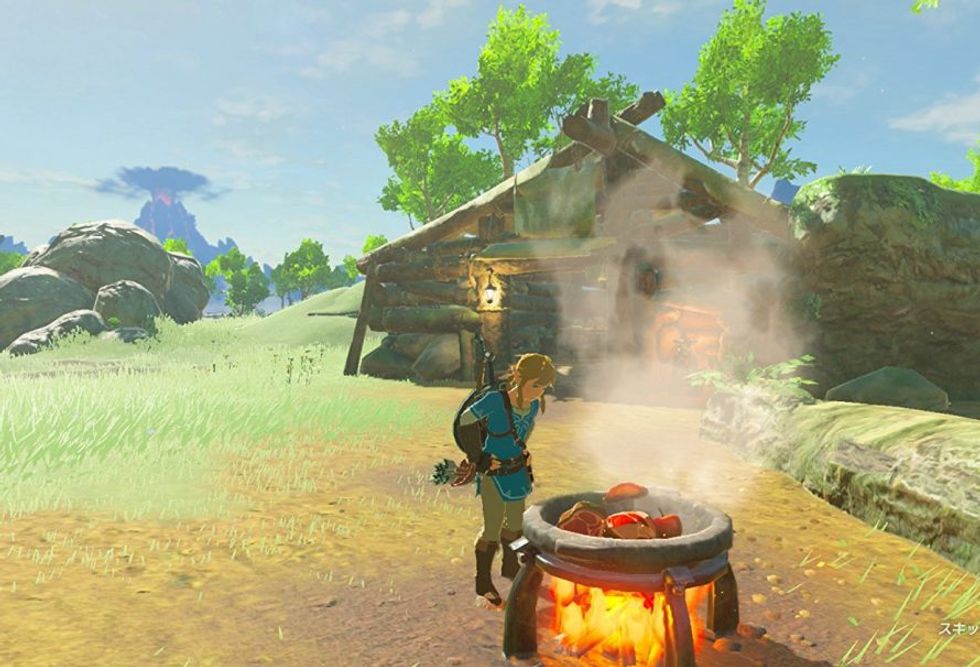Video games are a kind of art, whether you agree or not. They have visuals, music, a story (most of the time), and have countless hours of hard work put into them by their creators, testers, critics, lovers, and haters alike. There are bad games, and there are good games. That line is blurred more often than you think, and there are very, very few games in the world (in my opinion) that are objectively bad or good. What does this have to do with anything, though, right? Why am I saying these things?
"Legend of Zelda: Breath of the Wild" is a game that came out last year for the brand-new Nintendo Switch as a launch title, and it had been hyped for quite a while by fans and gamers alike. Personally, there were two things wrong with my view on the game itself. One, I was never a big fan of the LOZ series and formula, and two, I dislike hype. I've been disappointed by and had friends be disappointed by things that had false hype to be good but then ended up either being mediocre or just completely flopping altogether. So, the real question is: "Does BOTW live up to its hype?"
"Legend of Zelda" is one of the most beloved franchises in video game history, and first started back in 1986 on the NES and was created by video game superstar and Nintendo elite Shigeru Miyamoto, and has since evolved into a franchise spanning almost double-digit consoles and around 25 official games. The games are all different in some way but follow the same basic plotline: You play as Link, a green-clad young man who seeks to save the country of Hyrule from Ganon, an evil being created by malice and hatred incarnating in the shape of a man. You are helped by the equally-famous Princess Zelda, the daughter of the king of Hyrule, who uses her mastery of magic to assist Link in his quests. She occasionally needs saving, but sometimes she's kicking butt by his side. This formula is decades-old but is still loved and cherished today.
BOTW follows this formula almost to a T, actually. You wake up as a young man in some kind of chamber, where you find out that you are Link, the royal knight, and protector of Princess Zelda. You find out as well that you have been asleep for the past 100 years, and that you only just awoke from the injuries that you suffered. Next, you are tasked with finding and reclaiming the four Divine Beasts, great mechanical animals that were controlled by four of Princess Zelda's champions, and then to defeat Calamity Ganon in Hyrule Castle. The only problem with that? You are missing your amazing weapon of old: the Master Sword, a straight sword that uses the power of light to banish evil. You are also being dropped into a world full of perils that you have to overcome and learn from in order to succeed. You must find your sword, free the beasts, and defeat Ganon to save Hyrule and the Princess.
BOTW is an open-world game with so much to do that I could probably write a novel about it. Besides the main quests, there are countless extra things to do and people to meet and help that I can't even begin to go into detail. You'd need a guide to make sure you had seen everything. The world is beautiful and intricate, like a huge watercolor painting, almost. While BOTW doesn't have as good of "graphics" as other open-world favorites like "Skyrim" and "The Witcher 3: Wild Hunt", the game is stylized and perfect in its own way and doesn't need to necessarily look realistic to be considered excellent.
The characters are the most realistic part of the game, with many races and people besides the Hylian human-like people. There are the Zora, people who are essentially anthropomorphic sharks and squids, the Rito, who are feathered bird-people, the Urbosa, a tribe of desert-dwelling women who live in a sheltered society that drives away all men, and the Gorons, large, roundish creatures that are very durable, and who roll to move. Each of these tribe has their own culture and customs, and while the Gorons are very hospitable to you, you may find yourself at the spearpoint of an Urbosa guard if you make a mistake. Each of the champions, those who controlled the four beasts, are one from each of the tribes.
The music is stellar, and I often find myself wanting to boot up the game again just to hear it. The soundtrack is very piano-heavy, but it makes excellent use of this versatile instrument to denote peace, stillness, and tranquility, as well as danger, peril, and excitement. One of my favorite experiences playing the game was walking in the field minding my own business and hearing the beautiful, light piano flit by, when all of a sudden my ears are assaulted by high-pitched, fluctuating notes, indicating the presence of a Guardian, a gigantic, robot-like enemy that presented a real danger, as it can easily kill you early-game. The emotions that I felt from just the music alone were incredible, and that is just one example.
The story is come-and-go like I said before, but it's still amazing. One task you are given is to find all of the locations of the pictures on your Sheikah Slate, a piece of technology that is not unlike the Nintendo Switch gamepad, that takes pictures and scans enemies for you, along with many other things. When you find these places and remember these scenes, you are given fully-voiced scenes that bring clarity to the whole situation you're in, and you get to witness why the Princess did what she did for you, and it heightens your sense of urgency to defeat Ganon. I'm choosing not to talk about a lot for the sake of spoilers, but rest assured that the developers took extra time and care to craft such a unique and moving tale.
The gameplay is where I'm most concerned, and where I have some complaints. The game flows well and is beautiful, and most of the gameplay involves you solving puzzles and defeating enemies by using weapons or your bow. But unlike other Zelda games, you can't keep a weapon very long because they break. Before I played the game, I was disgusted by something like that, as I figured that a weapon I liked so much had no right to break, but it's not too bad, actually. Sure, it gets annoying having to switch weapons constantly because that spear you were using broke, but there are weapons literally everywhere.
The second issue I have is that the first few hours of the game can be brutal, particularly if you wander somewhere you technically aren't "supposed" to be in. There's really not a lot of balancing in this game, which is something that most open-world games have to account for. If you're low-level, only low-level enemies appear until you get to a certain point, but in this game, if you go somewhere that is technically "late-game", you may find yourself struggling. My final issue with the game is the stamina bar, which is consumed when you run, attack, and climb. I hate this feature in all games, but in this one, it's particularly obnoxious. You are expected to traverse and make your way through the area, and climb towers to unlock parts of the map for that area, but how can you do that when the stamina bar is so terrible? It runs out way too quick, in my opinion. You can make it bigger, but you have to choose between increasing stamina or health in this game when you have the item to do so, and it's almost always better to pick health. Climbing is also obnoxious, as the game punishes you for trying to get to the top faster by jumping. You also can't climb very well when it's raining, which is more often than you think.
Next, there are various shrines that you have to complete puzzles and challenges to get spirit orbs, which you can trade four of for another heart of health, or a quarter of a stamina wheel. These shrine challenges range from fun and interesting to just plain frustrating, especially the ones where you have to pick up the Switch or Wii U gamepad to move a ball through a maze. I was playing on a Switch Pro-controller (looks like an Xbox controller, and is the correct way to play a game), and I had to physically get up, break my immersion, and use the gamepad to navigate the stupid little ball inside the hole. It was obnoxious and honestly stupid, in my opinion.
While there are some annoyances in gameplay, there are plenty of mechanics that are cool and well-made. You can tame horses and ride them throughout the land, and there's a whole library of things you can cook over a fire to make food so that you can restore your health. The amount of consumable items is incredible and gives you a lot of freedom in crafting. I had some of the most fun seeing what I could make if I mixed an apple, a banana, rice, meat, and piece of fish in a skillet together. While it sounds gross, you could be surprised how tasty your finished product will look!
You'll be a master chef in no time, honestly.
In conclusion, "Legend of Zelda: Breath of the Wild" is an amazing game that is definitely worthy of a lot of the praise it gets, but I personally think that many critics and players overlook the obnoxious game design choices because they have nostalgia-goggles on. LOZ fans, like many fans, can be disillusioned about the most recent game because they hold their favorite series in such high esteem. This is true of almost any fan of a franchise, though. It's certainly rampant with "Pokémon" fans, that's for sure. Still, BOTW is absolutely worth playing if you can get your hands on it.
Pros:
+ Unique and beautiful aesthetic that sets it apart from other open-world games
+ Mesmerizing soundtrack that conveys every emotion under the sun at just the right time
+ Great writing and characters that will make you laugh out loud or even tear up a little
+ There are many layers of complexity to the game, like sneaking mechanics and the amount of food you can cook and armor you can find
+ A great story that makes you want to play it again and again
Cons:
- Some of the shrine puzzles are just plain obnoxious and unfun
- Has a lack of balancing, where you may run into late-game enemies if you wander too far away
- The stamina wheel is poorly-designed and breaks immersion
Final Verdict: 8.5/10






















